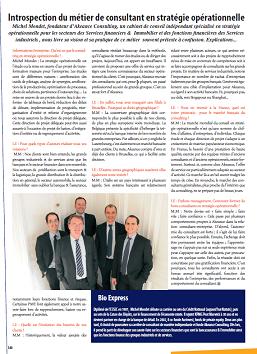Info Entreprise : introspection du métier de consultant en stratégie opérationnelle
 Michel Mondet, fondateur d’Akeance Consulting, un cabinet de conseil indépendant spécialisé en stratégie opérationnelle pour les secteurs des Services financiers & Immobilier et des fonctions financières des Services industriels , nous livre sa vision et sa pratique de ce métier souvent prétexte à confusion. Explications...
Michel Mondet, fondateur d’Akeance Consulting, un cabinet de conseil indépendant spécialisé en stratégie opérationnelle pour les secteurs des Services financiers & Immobilier et des fonctions financières des Services industriels , nous livre sa vision et sa pratique de ce métier souvent prétexte à confusion. Explications...
IE : Qu’ est-ce que le consulting en stratégie opérationnelle ?
Michel Mondet : La stratégie opérationnelle est l’étude ou la mise en œuvre d’un projet de transformation majeure pour l’entreprise. Les études sont de différentes natures : amélioration des outils de pilotage, analyse de synergies, amélioration de la productivité, optimisation de processus, choix de solutions, pertinence d’outsourcing ... La mise en œuvre de ces projets donne lieu à des refontes de tableaux de bord, réduction des délais de clôture, implémentation de progiciels, réorganisation d’entité et refonte d’organigramme où nous assurons la direction de projet déléguée. Cette direction de projet déléguée peut être aussi assurée à l’occasion de projet de fusion, d’intégration d’entités ou de regroupement d’activités.
Pour quels types d’acteurs réalisez-vous vos missions ?
M.M : Nos clients sont bien entendu les grands groupes industriels et de services ainsi que les banques et le secteur financier dans son ensemble. Nos secteurs de prédilection sont le transport & la logistique, la grande distribution & la distribution en général, le secteur automobile, le secteur immobilier sans oublier la banque & l’assurance, notamment leurs fonctions finance et risques. Certaines PME font également appel à notre savoir-faire lors de rapprochement, fusion ou regroupement d’activités.
I.E : Quelle est l’évolution des besoins de vos clients ?
M.M : Historiquement, la valeur ajoutée des consultants résidait beaucoup dans la méthode, qu’il s’agisse de mener des études ou de diriger des projets. Aujourd’hui, cet apport est insuffisant. Il convient de proposer une offre de service qui intègre une bonne connaissance du secteur opérationnel du client. C’est pourquoi, Akeance recrute des consultants qui ont, kasino pour la plupart, un passé professionnel au sein de grands groupes. C’est un atout fort d’Akeance.
I.E : En juillet, vous avez inauguré une filiale à Bruxelles ; pourquoi ce choix géographique ?
M.M : La couverture géographique doit correspondre le plus possible à celle de nos clients, de plus en plus européens voire mondiaux. La Belgique présente la spécificité d’héberger la trésorerie et/ou la banque interne de bon nombre de grandes entreprises. Par ailleurs, si on y englobe le Luxembourg, c’est clairement un marché bancaire à part entière. Du reste, Akeance compte d’ores et déjà des clients à Bruxelles, ce qui a facilité cette décision.
I.E : D’autres zones géographiques suscitent-elles également votre intérêt ?
M.M : L’Italie est un pays intéressant à plusieurs égards. Son système bancaire est relativement éclaté entre plusieurs acteurs, ce qui amène nécessairement soit à des projets de rapprochement et/ou de mise en commun de compétences soit à se faire accompagner de consultants sur leurs grands projets. En matière de services industriels, notons l’importance en nombre de rachat d’entreprises italiennes par des groupes français. Genève est également une cible d’implantation pour Akeance, eu égard à son activité bancaire. Et, pourquoi pas, au-delà, vers Singapour ou Shanghaï…
I.E : Pour en revenir à la France, quel est votre pronostic pour le marché français du consulting ?
M.M : Le marché mondial du conseil en stratégie opérationnelle n’est qu’une somme de chiffres d’affaire, d’entreprises, d’individus. Chaque étude et chaque direction de projet s’adapte à un croisement de matrice pays/secteur économique. En France, le besoin d’une prestation de haute qualité, exercée par des équipes mixtes d’anciens consultants et d’anciens opérationnels, existe fortement. Surtout si, comme chez Akeance, l’offre de service est particulièrement adaptée au secteur d’activité. Ce marché-là a un bel avenir malgré les temps de crise. En revanche, le marché des consultants généralistes, plus proche de l’interim que du consulting, ne se prépare pas de beaux jours.
I.E : Parlons management. Comment former de bons consultants en stratégie opérationnelle ?
M.M : Notre devise est « faire simple ; faire vite ; faire confiance ». Cela passe par plusieurs comportements propres à Akeance dans la relation consultant-entreprise. D’abord, l’autonomie du consultant est forte ; il s’agit de lui faire confiance le plus possible. Ensuite, l’échange doit être permanent entre les équipes ; l’apprentissage ne s’appuie pas sur sa seule expérience mais peut s’appuyer sur celle des autres, par procuration, en quelque sorte. Enfin, la réussite doit est concrétisée par une gratification financière. C’est pourquoi, tous les consultants ont accès à un bonus annuel très significatif, fonction des résultats de l’entreprise et des performances & du comportement du consultant.